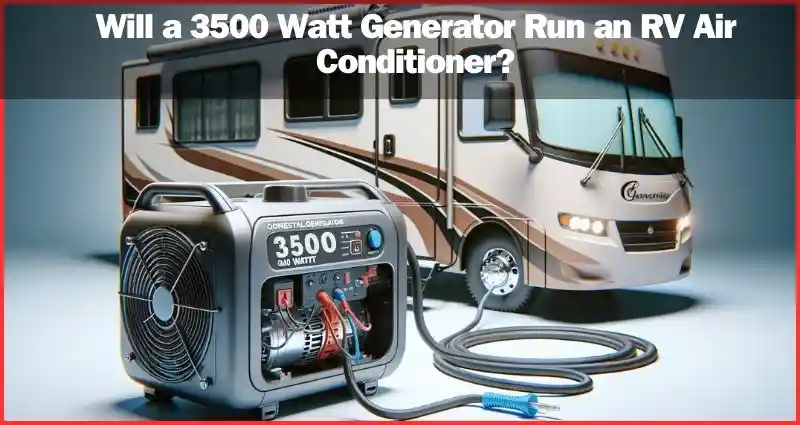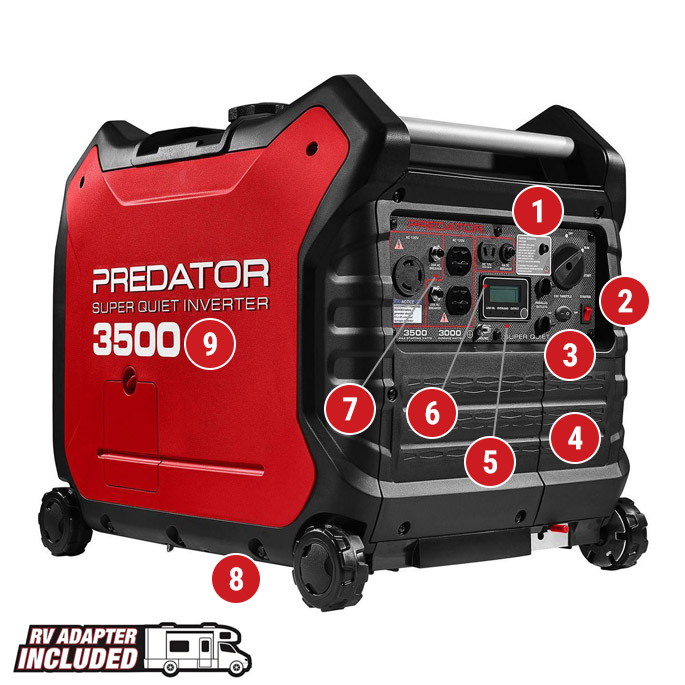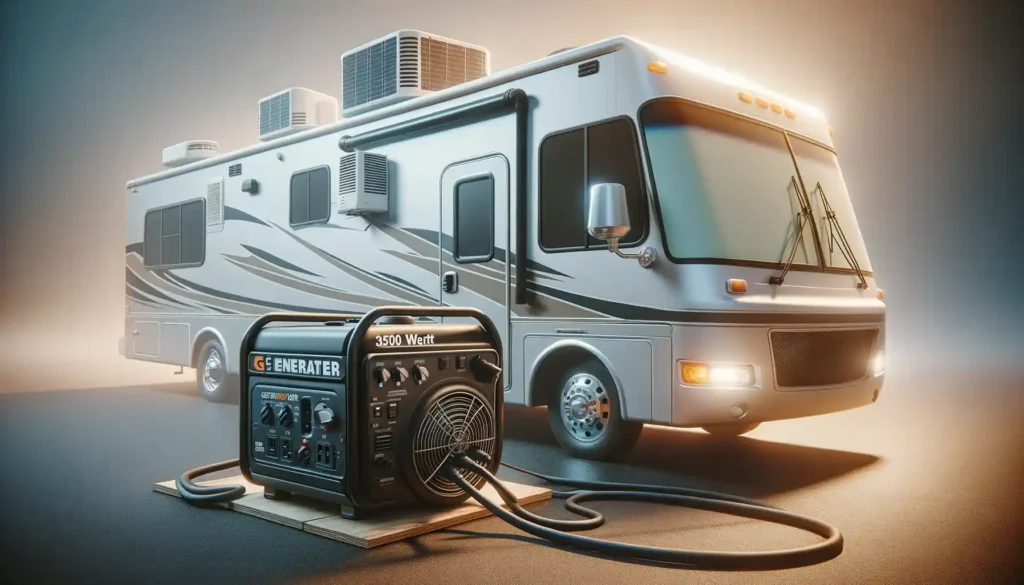Yes, a 3500-watt generator can run an RV air conditioner, as typical RV air conditioners require 2000-3500 watts for operation. By providing enough power, the generator can effectively run the air conditioner when needed.
When planning to power an RV air conditioner with a generator, it’s essential to establish the necessary wattage. Typically, most RV air conditioners require 2000-3500 watts to operate efficiently.
The discussion surrounding this topic often arises when choosing the right generator for camping or living in an RV. There are various resources available, such as the Wattage Chart by Ramsond and discussions on forums like RV.
Net, providing insights into generator requirements for running an RV air conditioner. Specific models like the Harbor Freight Generator are also investigated in this context.
The use of a generator to power an RV air conditioner can be a vital consideration for anyone looking to ensure a comfortable and reliable experience while on the road.
Assessing Rv Air Conditioner Power Needs

An essential aspect of RV travel is ensuring that your recreational vehicle has the necessary power to run its appliances, especially the air conditioner.
Understanding the power requirements of your RV air conditioner is crucial to choosing the right generator size. Let’s delve into the intricacies of RV air conditioner wattage requirements, types of RV air conditioners, and factors affecting power consumption to help you make an informed decision.
Understanding Rv Air Conditioner Wattage Requirements
RV air conditioners typically have varying wattage requirements, and it’s important to comprehend these specifications to select an appropriate generator for your RV.
Most RV air conditioners have power ratings ranging from 2000 to 3500 watts depending on the model and cooling capacity.
It’s paramount to match the generator’s wattage output with the air conditioner’s power requirement to ensure optimal performance.
Identifying Different Types Of Rv Air Conditioners
When assessing power needs for RV air conditioners, it’s crucial to consider the different types available. There are primarily two types of RV air conditioners: ducted and non-ducted.
Ducted air conditioners distribute cool air through vents, while non-ducted units release air directly into the RV.
Understanding the type of air conditioner in your RV is essential for accurately determining the power supply required to run it.
Examining Factors Affecting Power Consumption
Several factors influence the power consumption of RV air conditioners, including the ambient temperature, humidity, insulation, and the air conditioner’s energy efficiency rating.
Additionally, the size and layout of your RV can impact power usage. By examining these factors, you can better estimate the power needs for your RV air conditioner, helping you choose a suitable generator for your travel needs.

Credit: www.harborfreight.com
Does A 3500 Watt Generator Suffice?
A 3500 watt generator possesses the capacity to power an RV air conditioner, making it a suitable option for your recreational vehicle.
However, it is vital to understand the limitations and benefits of using a generator of this size to ensure seamless functionality and convenience during your travels.
Matching Generator Output With Rv Air Conditioner Wattage
When considering the use of a 3500 watt generator to power your RV air conditioner, it is important to match the generator’s output with the wattage requirements of your specific air conditioning unit.
Most RV air conditioners typically operate within the range of 2000 to 4000 watts, making a 3500 watt generator a compatible option for providing sufficient power.
Benefits Of Using A 3500 Watt Generator For Rv Air Conditioning
- Convenient power source for cooling your RV in various outdoor settings
- Portability allows for flexibility and mobility during travels
- Cost-effective solution compared to larger generator models
Potential Shortcomings When Running Other Appliances Simultaneously
While a 3500 watt generator can adequately power an RV air conditioner, it may have limitations when running additional appliances simultaneously.
It is crucial to prioritize the usage of electrical devices and appliances to prevent overloading the generator and ensure consistent performance for your RV air conditioning needs.
Generator Selection For Rv Air Conditioning

When it comes to enjoying a comfortable vacation in your RV, ensuring that your air conditioner runs smoothly is essential.
One crucial aspect that directly impacts your RV air conditioning’s performance is the selection of a suitable generator.
Choosing the right generator for your RV is vital to guaranteeing a reliable power source for your air conditioning system.
In this post, we’ll evaluate and discuss the various aspects of generator selection for RV air conditioning to help you make an informed decision.
Evaluating Generator Capacity And Power Stability
Before selecting a generator for your RV air conditioner, it’s essential to evaluate the generator’s capacity and power stability. The capacity of the generator is measured in watts, and it should be sufficient to power your RV air conditioning unit.
Additionally, considering power stability is crucial to ensure that the generator can deliver consistent and reliable power to support the air conditioner’s operation without fluctuations or interruptions.
Importance Of Starting Watts Versus Running Watts
Understanding the difference between starting watts and running watts is crucial when selecting a generator for your RV air conditioner.
The starting watts represent the initial surge of power required to start the air conditioning unit, while the running watts indicate the sustained power needed to keep the air conditioner running.
It’s important to choose a generator with sufficient starting watts to handle the initial power spike and ample running watts to sustain the air conditioner’s operation.
Criteria For Choosing The Right Generator For Your Rv
When choosing a generator for your RV air conditioning, several criteria need to be considered to ensure compatibility and optimal performance.
These criteria include evaluating the generator’s wattage capacity, considering the power stability, assessing the noise level, and examining the fuel efficiency.
Additionally, the portability and ease of maintenance of the generator are essential factors to consider for your RV’s convenience.
Ensuring Efficient Operation
Ensuring efficient operation of your RV air conditioner using a 3500-watt generator requires a careful balance of power usage and proper maintenance.
Whether you’re planning a long trip or need a backup power source, understanding the best practices for running your RV air conditioner on a generator is essential for a comfortable and hassle-free experience.
Tips For Running Your Rv Air Conditioner On A Generator
When running your RV air conditioner on a 3500-watt generator, consider these tips to ensure efficient operation:
- Use energy-efficient settings on your air conditioner such as adjusting the temperature and fan speed to reduce power consumption.
- Limit the use of other high-wattage appliances when the air conditioner is running to avoid overloading the generator.
- Regularly monitor the generator’s fuel and oil levels to maintain consistent power output.
Maintenance Considerations For Longevity
To maintain the longevity of your generator and RV air conditioner, it’s important to follow these maintenance considerations:
- Perform regular maintenance on your generator, including oil changes, filter replacements, and spark plug inspections, as recommended by the manufacturer.
- Clean the air filters of your RV air conditioner to ensure optimal airflow and cooling efficiency.
- Inspect and tighten electrical connections to prevent power interruptions and potential damage to the air conditioner or generator.
Best Practices To Maximize Power Usage
Maximizing power usage is key to efficient operation when running your RV air conditioner on a 3500-watt generator. Here are some best practices to consider:
- Opt for an energy-efficient RV air conditioner model to reduce overall power consumption.
- Utilize shade and ventilation to minimize the need for continuous air conditioner usage, especially during hot weather.
- Consider investing in a generator with automatic load-sensing technology to optimize power output based on demand.
Dealing With Power Variability Issues
When it comes to powering an RV air conditioner with a 3500 Watt generator, managing power variability issues is crucial. Understanding power fluctuations and implementing techniques to ensure a consistent power supply are essential in protecting your RV air conditioner and preventing potential damage.
In this article, we will delve into the impact of power fluctuations on RV air conditioners and explore effective methods to manage inconsistent power supply.
Additionally, we’ll emphasize the significance of surge protectors and power stabilizers in safeguarding your RV’s electrical system.
Understanding Power Fluctuations And Their Impact On Rv Air Conditioners
Power fluctuations can significantly impact the performance and longevity of RV air conditioners. Sudden voltage spikes or drops can strain the compressor and other components, leading to premature wear and potential breakdowns.
Additionally, inconsistent power supply can cause the air conditioner to operate inefficiently, affecting the cooling capacity and overall comfort inside the RV.
Techniques To Manage Inconsistent Power Supply
Managing inconsistent power supply is vital for ensuring the optimal function of an RV air conditioner when connected to a 3500 Watt generator.
Techniques such as load balancing, proper maintenance of the generator, and adjusting the air conditioner settings can help mitigate the effects of power variability.
Importance Of Surge Protectors And Power Stabilizers
Utilizing surge protectors and power stabilizers is paramount in safeguarding the RV’s electrical system from power irregularities.
Surge protectors shield against sudden voltage surges, while power stabilizers regulate the incoming voltage to ensure a stable power supply to the air conditioner.
These devices play a critical role in preventing electrical damage and maintaining the air conditioner’s optimal performance.
Real User Experiences
Yes, a 3500 Watt generator can typically run an RV air conditioner. Real user experiences and feedback often indicate that a generator of this size is sufficient for powering an RV air conditioner. You can find more specific details and calculations through related blog posts and forums such as those on the EcoFlow Blog and RV.
Anecdotes from RVers using 3500 watt generators
To get a fair idea of whether a 3500-watt generator can run an RV air conditioner, let’s explore some real user experiences. According to anecdotes shared by RVers, a 3500-watt generator is generally capable of powering an RV air conditioner. However, certain factors such as the efficiency of the RV air conditioner and the additional load on the generator can impact its performance.
Common issues encountered and solutions
Despite the general suitability, a few common issues have been encountered by RVers when using 3500-watt generators to power their air conditioners. Some of the issues and suggested solutions include:
1. Overloading: Users have reported overloading their generators when simultaneously running the air conditioner and other appliances. To mitigate this issue, it’s recommended to utilize appliances judiciously and consider staggering their usage.
2. Startup Surge: A significant surge in power demand occurs during the initial startup of an RV air conditioner, often causing strain on the generator. Some RVers have addressed this by using a soft start kit or allowing the air conditioner to start before connecting the other appliances.
3. Generator Capacity: It’s vital to ensure that the 3500-watt generator has sufficient capacity to handle the starting wattage as well as the continuous running wattage of the air conditioner. A careful assessment of the generator’s capacity compared to the air conditioner’s requirement is essential.
Lessons learned for stress-free RV air conditioner operation
Learning from these experiences, there are several lessons for stress-free RV air conditioner operation using a 3500-watt generator:
1. Prioritize Power Management: Take proactive steps to manage power consumption by prioritizing the use of appliances and considering the sequence of their operation. This can prevent overloading and ensure consistent power supply to the air conditioner.
2. Soft Start Kits: Consider investing in a soft start kit for the RV air conditioner, as this can significantly reduce the power surge during startup, easing the strain on the generator.
3. Understanding Wattage Requirements: To avoid potential issues, it’s crucial to have a clear understanding of the wattage requirements of both the air conditioner and other appliances being powered by the generator. This helps in making informed decisions and preventing overload situations while ensuring smooth operation of all devices.
By leveraging these user experiences, common issues, and learned lessons, RVers can effectively manage their RV air conditioner operation, ensuring reliable performance while using a 3500-watt generator.
Frequently Asked Questions For Will A 3500 Watt Generator Run An Rv Air Conditioner?
How Many Watts Does An Rv Air Conditioner Need?
An RV air conditioner typically needs 1,600 to 3,500 watts to operate effectively. It’s recommended to consult the specific AC unit’s wattage chart for exact requirements. Use a generator with sufficient wattage to power the AC, ensuring enjoyable camping experiences.
Will A 3000 Watt Generator Run A 13500 Btu Air Conditioner?
Yes, a 3000 watt generator can run a 13500 BTU air conditioner efficiently.
What Size Generator Do I Need For A 15000 Btu Rv Ac?
For a 15000 BTU RV AC, you need a generator with a minimum of 3500-4000 running watts.
Will A Predator 3500 Run A 50 Amp Rv?
Yes, the Predator 3500 can power a 50 amp RV with the proper adapter. Be sure to calculate the power needs of all your appliances.
Conclusion
To sum up, a 3500 watt generator can run an RV air conditioner, but it’s crucial to consider the AC unit’s starting and running wattage. Proper maintenance and understanding your RV’s power needs are essential for a smooth camping experience.
Always refer to the manufacturer’s recommendations for the most accurate information.
